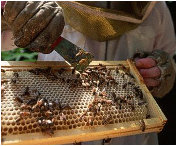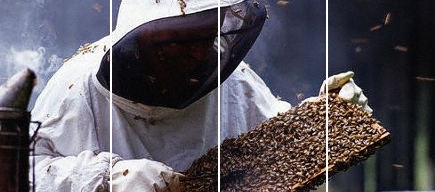 |
 |
Actually, the "domestic bees" are not domestic at all. Although man have been exploited their work for thousands of years, collecting honey from wild swarms or by means of breeding, honey bees have not changed anything of their original behaviour. The beekeeper models his work based on the instinct of its insects. His main activity is to bring the colony to a situation where it accumulates more stocks of those which would be actually indispensable, so as to be able to take away the most of them. In exchange, the beekeeper provides the necessary assistance so that the colony can survive to the winter without problems.
The beekeeper performs bio-compatible treatments in order to eliminate the parasites infesting the honey bees (e.g. Varroa Jacobsini). A particular job related to the production of honey is the transport of hives to the place of the most important blooms (nomadism).
The most widespread breed of bees in Italy, of which we are farmers, is the Apis Mellifera Ligustica, known as the "Italian Honey Bee". Honey requires very few steps to get to our table directly from the hive: all products share an extraction by centrifugation, and a filtration and purification. At the end of these steps honey may already be pot in jars; however, other techniques aimed at a better presentation can be applied, so as to change neither the initial characteristics of the product nor its substances.
Heat treatments can be used with different purposes, e.g. for liquefying an already crystallised product, or for extending its life time in liquid form: they always have a negative effect in terms of loss of flavour and important substances, an effect which is proportional to the temperature and the duration of heating
|
|
 |
|


